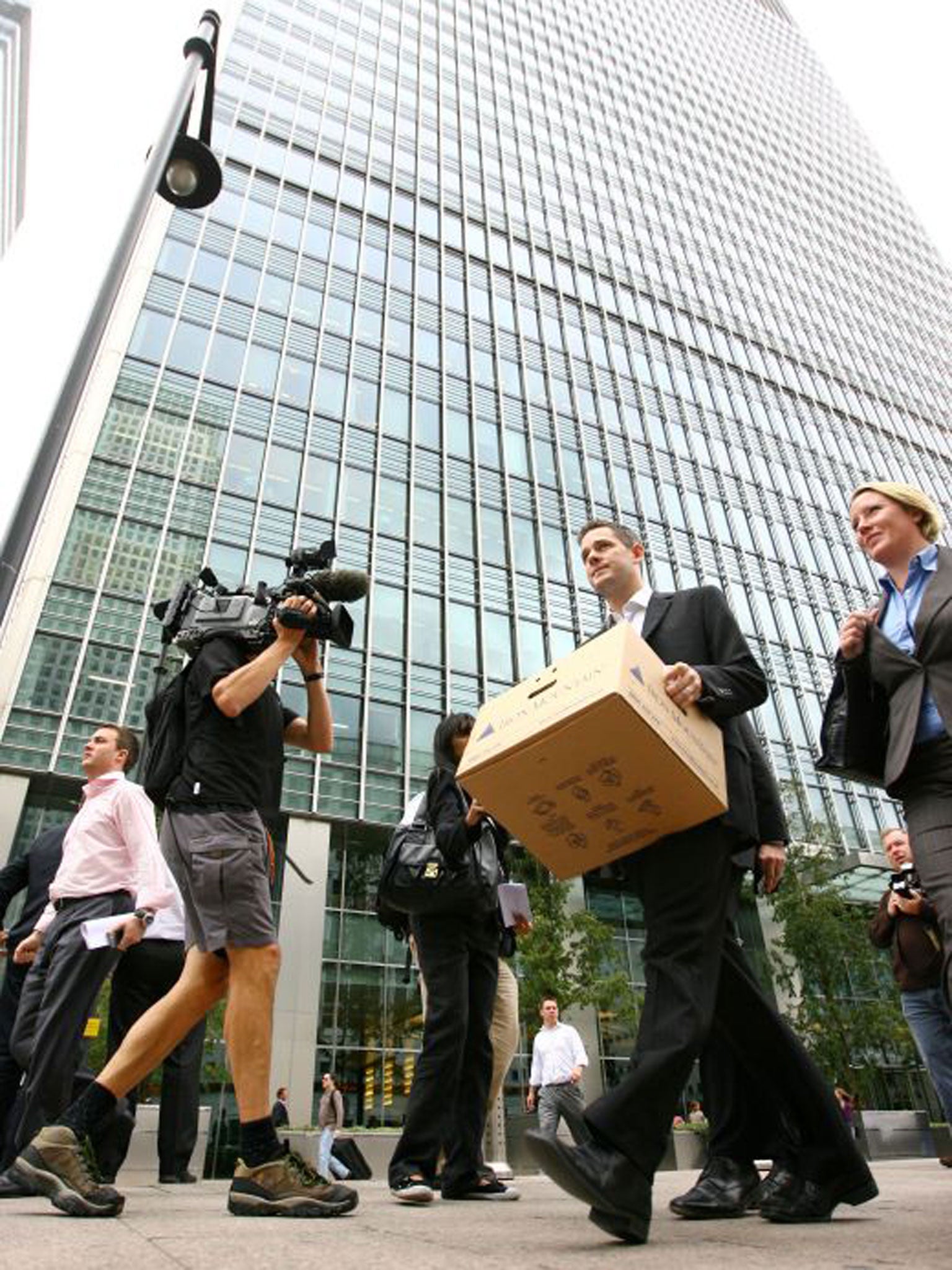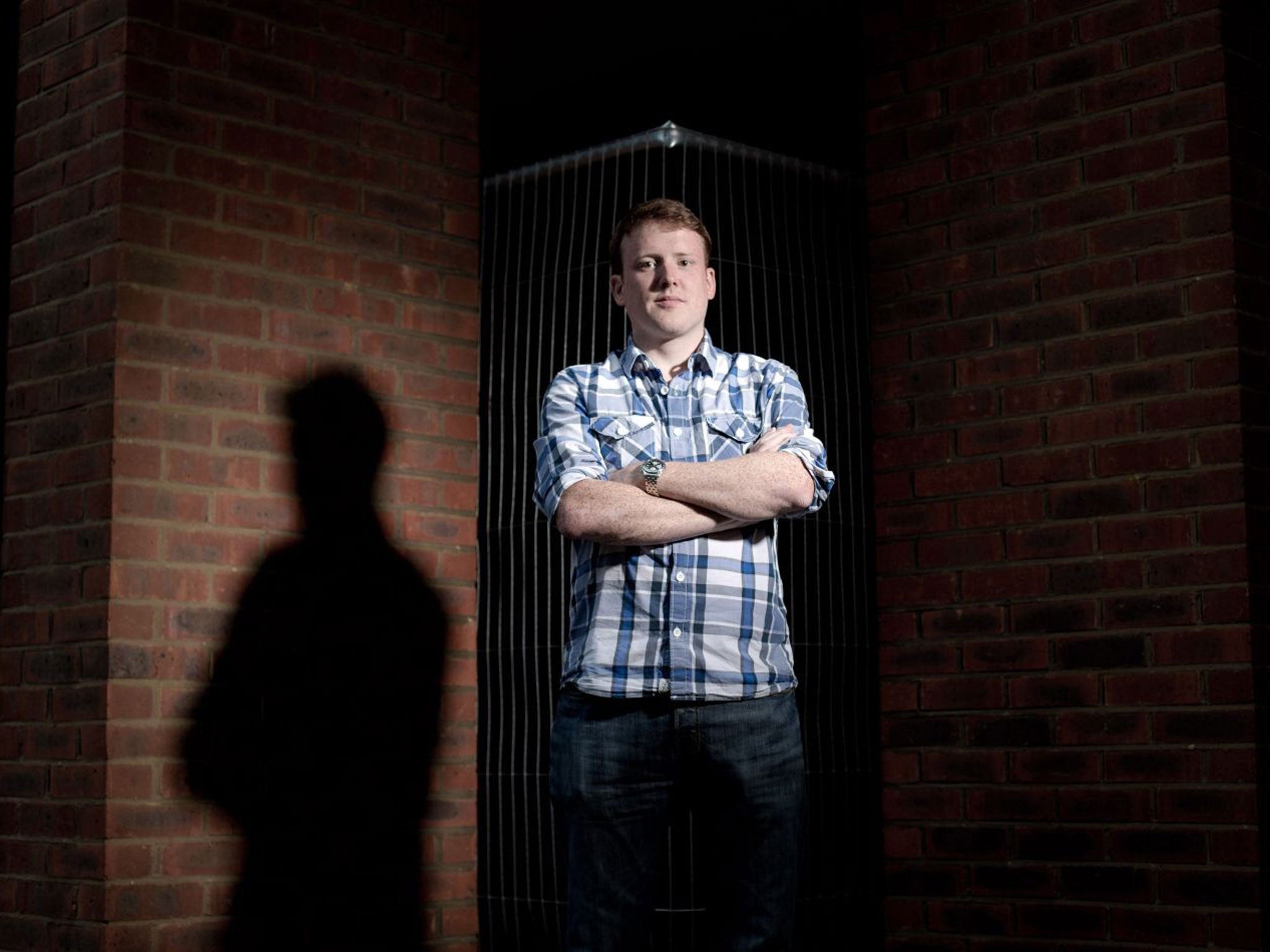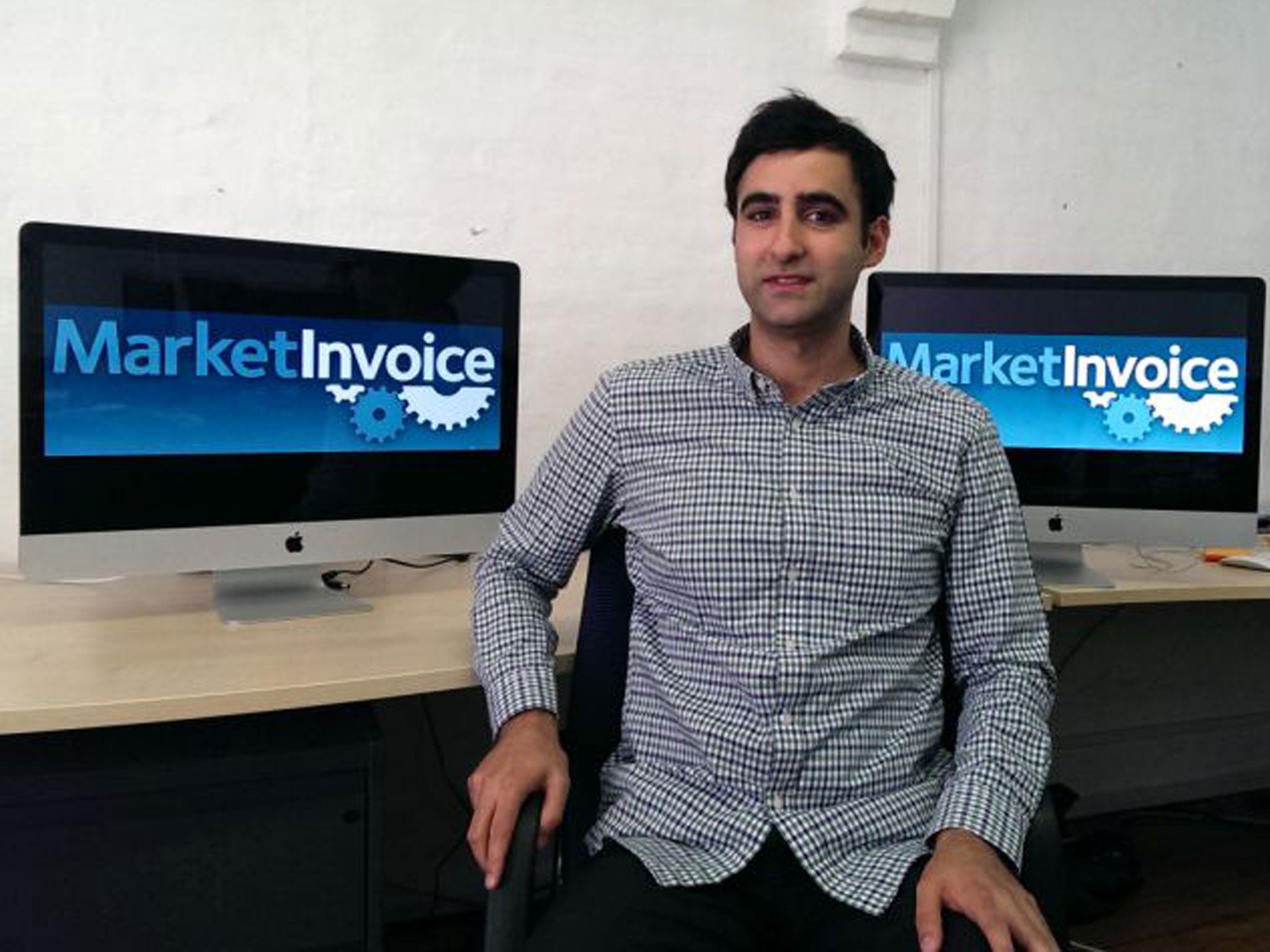Life after Lehmans: What became of the people at the eye of the banking storm, five years on?
James Moore tracks down the cardboard box-carriers pictured on every front page

There has never been a crisis like it – the collapse of Lehman Brothers five years ago next week almost destroyed the world’s financial system. It may seem scarcely credible now, but there were reports at the time of hedge-fund managers paying top dollar for flocks of sheep with which to barter as the world panicked about just how bad it could get. The resulting economic tsunami was the catalyst for the eurozone crisis and the deepest recession in a generation, and saw billions of pounds spent bailing out Britain’s banking industry. Where Lehmans provided the defining moment of the financial meltdown it also gave it a human face, via the hundreds of bright and hard-working young people – largely innocent of the chicanery, venality and hubris that led to Lehman’s collapse – who suddenly saw their careers go up in smoke. So what became of them? James Moore finds out...
From high finance to high stakes poker, Mark Cudmore’s career since leaving Lehman Brothers has been nothing if not colourful. He joined the bank straight from Dublin’s Trinity College and became a trader in the currencies of so-called “emerging markets” - fast growing, if risky, economies. “I loved it. I loved my job,” he says. “I’m embarrassed to admit I became a bit brainwashed to Lehmans’ ways. I was very bearish on the economy, and I thought the banking industry was screwed, but I told my girlfriend that I thought Lehmans was the safest. I didn’t realise that we were being fed lies.”
Just a day or so before the collapse Cudmore had been in Budapest on business, and had reassured junior staffers there that the worst simply couldn’t happen. From Hungary he flew to Turkey for the compulsory “long” holiday of just over two weeks that traders are required to take by regulators so that their work can be audited in an attempt to catch any mischief that some may have been tempted to commit. It was in an Istanbul hotel that he read about the meltdown in Manhattan.
“I said to my girlfriend: ‘I think I’ve lost my job.’ People were saying: ‘Come back,’ they were panicking. But I was very lucky. I had a good boss who negotiated several other jobs for me.”
Instead of moving to another bank Cudmore opted to join a hedge fund, but failed to last beyond his probationary period. Now that company, too, no longer exists. From there Cudmore had spells at Standard Chartered and Nomura – talented traders are a very valuable commodity, even when the market is tanking. But a whistlestop tour of the City he decided he was in need of a break, quite his job, and headed for Las Vegas and the World Series of Poker, where the overall champion can walk away with close to $10m. “My brother is the main poker player in the family. He’s played seriously for a while and he was planning to go out to play the World Series. I decided to quit my job to join him,” he says.

Cudmore is no slouch himself, and had won nearly $8,000 playing for progressively bigger stakes online. He was just $2,000 short of the entry fee for the World Series when he lost the lot practicing before the tournament. Despite the setback he pressed on, with his brother agreeing to split any cash he won before the Vegas tournament to get him into the game. When he finished in the money - no mean feat when you’re taking on some of the best players in the world - the $25,000 he gave to Mark covered his costs, and more.
As well as the poker, the pair had been funding themselves counting cards on the Strip’s blackjack tables. The technique, which requires considerable skill, a particularly memory, and some acting ability to keep casinos off the scent, involves keeping track of the high value cards. When a “shoe” of cards contains lots of tens and picture cards the odds of winning shift dramatically in favour of the player and against the “house”. Many people think they can do it, few manage it successfully. Being caught counting in Vegas will get you banned from the floor, but if you can pull it off you have the edge over the house.
“My brother was checking the count with me in Irish, because I was better. We made a lot very quickly, so you get checked and we weren’t drinking [often a giveaway, as to count effectively requires great concentration]. It was very obvious. Suddenly there were quite a few staff members around us and no people, and then the manager of the floor and two very, very large security guards came up to us with big smiles.”
The brothers wisely decided to stop, and were even allowed to keep their winnings, but are now banned from blackjack and blackjack-related games at the Cosmopolitan casino and its affiliates. Deciding that perhaps gambling wasn’t a viable career option, Cudmore returned to finance. Another bank beckoned, this time Germany’s Commerzbank. His experience at Lehman meant he “wanted his career in banking to end on a high” he explains, and although he still trades - now using his own money - he confesses he “hasn’t got that much”.
Today he’s ditched finance for the third time and now keeps busy pursuing his stage two FA football coaching badge and taking creative writing courses. Cudmore, who has more charm in his little finger than you’ll find in the entire boardroom of most modern banks, surely has a story or two in him.
Lord Turner, the one-time chairman of the Financial Services Authority, once questioned whether what investment banks were doing was “socially useful”. Five years on from Lehmans’ collapse, Anil Stocker remains in finance - and no one would question the usefulness of what he does now.

Stocker embarked on a career at Lehman aged just 22 in 2006 after reading Economics at Cambridge. Joining the firm’s private equity division, which bought or took stakes in other companies, he was thrown in at the deep end. “I was the most junior guy, doing research, looking at markets we were approaching and companies to see whether they were worth investing in,” he says. “I had to understand everything about a business and then report to the boss. The cost of getting it wrong could be very, very high so there was a lot of pressure to make sure no stone went unturned.”
His days started at 9am, but often ended in the early hours and he regularly worked weekends. At one point he didn’t take a day off for two months straight. Now 29, Stocker knew the writing was on the wall for Lehmans after being told by a colleague that he might need to find another job. But the end still came as a shock.
“I went from 16-hour days to not knowing what to do,” he says. So he upped sticks for Paris with the aim of getting his head straight. More than 30 job applications eventually yielded a post at a small finance house where the more regular hours “felt like a half day”.
Today he has found success after striking out with a former Goldman Sachs banker and a computer whizz, both of whom he knew at Cambridge. That’s where the socially useful comes in. The three friends formed a company that uses the internet to get finance to small companies, allowing them to cash in on invoices. Such “factoring” is not new, but Stocker’s MarketInvoice.com is web-based and far more flexible than traditional models. It has raised nearly £67m for companies and counts Vince Cable’s business department as a £5m investor member.
By the time Lehmans collapsed, Adam Taylor says his initial excitement at joining the company in 2006 had long since disappeared.
As an analyst in mergers and acquisitions, he’d walked into a multinational club of the best and the brightest graduates who worked at the heart of London’s Canary Wharf. [NOT KNOWN] “It was very exciting, glamorous even. It was an achievement just to get in,” he says.
But it wasn’t all that long before Taylor, now 31 and living in Stratford-upon-Avon, who got a first-class degree in Manufacturing and Engineering at the University of Warwick, started to feel that he was just a well-paid errand boy. There were a few nice perks, but the hours were brutal.
“You’re paid to be there long hours, to be reliable so you can spell-check, check numbers, make sure nothing you put out will make the bank look silly,” he says. “Because it is so competitive they can demand people with good intelligence and academic qualifications. But while investment banking is sold as entrepreneurial, we were basically just executing things. There wasn’t really any creative input at all.”
Nonetheless, getting fired still came as a shock. “No one really expected it. Some of the bosses were still buying shares the just before it happened - they thought the stock was cheap. I got pretty low, I was depressed, and I became ill. I think because of a reaction to the 16-hour days.”
A brief stint in management consulting felt little different, and when his girlfriend noticed how her mother struggled with great bags of pet food, the couple decided it was time to work for themselves.
That led to PetShopBowl.co.uk, a home delivery subscription pet food service. Set up in 2011 with the aid of a small grant from the Prince’s Trust it is set to turn over £3m this year and now boasts 40,000 customers “People will go without themselves rather than see their pets go without,” says Taylor, which is one reason he chose to strike into the market in the depths of a recession. “I’m finally able to utilise my creativity,” he adds.

Saeed Amen stayed in banking despite his experiences at Lehmans, at least until recently. Amen, 30, a graduate of Imperial College London, has now struck out on his own, selling his own research, holding trading seminars, and writing a book slated for publication in 2015.
He traces the genesis of “Trading Thalesians - What the Ancient World Can Teach You About Trading Today” to the bank’s demise. Indeed the last day makes up the first chapter of the book. “It was strange,” he says. “On the Friday, September 12, the heads of the trading floor bought pizza for everyone there. There were all these trolleys with Domino’s and Papa John’s. It felt like the end - and on the Monday morning it was.”
His firing, he says, was no dramatic Lord Sugar-style affair. Rather it was handled by a bespectacled accountant who “politely told a crowded auditorium to leave their desks”.
Shortly afterwards he joined a friend and former colleague to form “the Thalesians”, a think tank for people with an interest in “finance, economics, mathematics, physics and computer science” which runs seminars and has gone global. It (and the book) are named for Thales, a Greek philosopher who made the first documented derivative trade - on the price of olives.
Amen, who helped develop a trading system known as MarQCuS at Lehmans, stresses that he enjoyed his time at the bank, despite how it ended. “The foreign exchange desk was a great place to work. It was also a successful desk - even in the last year it was growing.”
He subsequently found work at Nomura, the Japanese bank that bought Lehmans’ UK assets, only recently departing to start the book and make a go of selling his own research. Later, a novel on the Arab world is in his sights.
“I’m happy. I can’t complain. After Lehmans went out I got a job quickly and I really enjoyed it. I have had a good opportunity now, to go out on my own and write this book which probably wouldn’t have happened if Lehmans hadn’t gone bust.”
Join our commenting forum
Join thought-provoking conversations, follow other Independent readers and see their replies
Comments